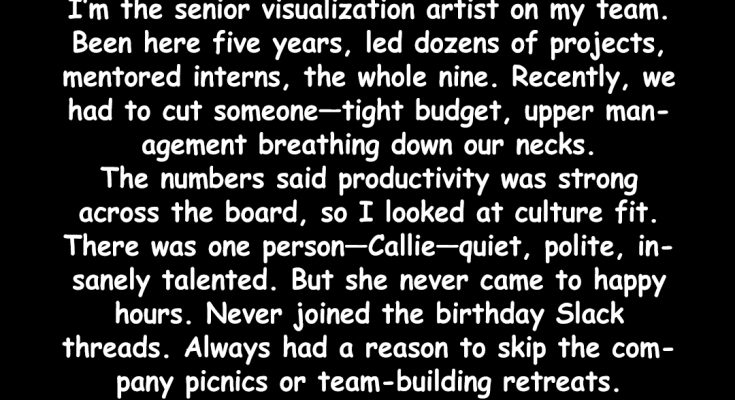She hit every deadline, never missed a meeting—but because she didn’t do social events, I let her go.
I’m the senior visualization artist on my team. Been here five years, led dozens of projects, mentored interns, the whole nine. Recently, we had to cut someone—tight budget, upper management breathing down our necks.
The numbers said productivity was strong across the board, so I looked at culture fit.
There was one person—Callie—quiet, polite, insanely talented. But she never came to happy hours. Never joined the birthday Slack threads. Always had a reason to skip the company picnics or team-building retreats.
She wasn’t rude, just… absent.
When we announced layoffs were coming, I had to pick. I looked at the work. No red flags. Then I looked at “engagement.” And that’s where she stood out.
I told her on Friday. She didn’t argue. Just said, “I guess showing up and doing my job well wasn’t enough.”
Now HR is asking questions. Apparently, several team members filed complaints on her behalf.
And yesterday, my director pulled me into a meeting and—
—asked me to walk him through my decision process.
I figured it’d be quick. I had my spreadsheet, my notes, my neat little logic tree about culture contribution. But when I got to Callie’s name, something shifted in his tone.
He leaned back, eyes narrowed. “Did Callie ever receive negative feedback about her performance?”
“No,” I said. “She was solid. Great, even.”
“Then explain why she was chosen over someone who’s been on a performance improvement plan for three months.”
I blinked. “Because… culture?”
He didn’t say anything right away. Just stared at me like he was waiting for me to hear how empty that sounded.
“Do you know why Callie never came to those events?” he asked.
“I never asked,” I admitted.
“Maybe you should have.”
That was the first real hit. It caught me off guard—like realizing mid-sentence that I was on the wrong side of the story.
After the meeting, I went back to my desk. My inbox had blown up. Four emails from HR. Two anonymous feedback messages. And one from Callie.
I stared at it for a long time.
It wasn’t angry. She simply wrote, “If anyone ever asks, I skipped the social stuff because my husband was sick. Dialysis. Nights and weekends. I didn’t want to make it everyone’s problem, so I just kept my head down and worked.”
I felt my stomach drop.
That was the second hit—and it landed lower.
That night, I couldn’t sleep.
I kept thinking about how I’d mentally marked her “not a team player” without knowing the first thing about her life.
At the next team check-in, the vibe was different. Colder. I noticed people avoided eye contact. Conversations were clipped. A few of the junior designers barely said a word.
I tried to pretend everything was normal, but it wasn’t. Not even close.
A week passed. Then two.
One morning, my director called again. “I’m moving your team under Lacey’s department for now. HR’s reviewing your leadership style. You’ll stay on as IC—individual contributor—for the time being.”
It was said in such a calm, measured tone, but it hit like a thunderclap.
“Wait,” I said. “I’m being demoted?”
“It’s not a punishment,” he said. “It’s a pause. We just need to understand the bigger picture.”
I tried to defend myself. Tried to explain that culture was part of performance. That connection mattered.
But deep down, I already knew—I’d been wrong.
I stayed quiet for the next few weeks.
I kept my head down. I worked. I delivered. Funny how quickly I started to feel like Callie.
One Friday afternoon, I ran into Lacey in the break room. She poured herself a tea and said, “You know, I had lunch with Callie once. She told me about how she used to do oil paintings before her husband got sick. Had to sell most of her art supplies to help cover hospital bills.”
I didn’t know what to say.
“She was one of the best minds we had,” Lacey added. “And not just at work. She organized secret Santa behind the scenes. Made a spreadsheet for people’s birthdays. Even ordered the card when that intern left.”
I stood there, stunned. The quiet one. The one I thought never showed up.
“She did all that?” I asked.
Lacey nodded. “You just never saw it.”
I started paying attention after that.
Turns out, people contribute in all kinds of ways that don’t show up at the pub or the company picnic.
There was Teresa, who always checked on people privately when they were going through stuff. Mark, who stayed late to help new hires but never brought it up in meetings. And Jules, who built templates that saved the team hours—but didn’t care to take credit.
I realized I’d been leading from the outside in. Measuring noise instead of impact.
It hurt to admit.
But it also lit a fire.
Three months later, I was asked to present a new team collaboration guide during our leadership summit.
I opened with something unexpected: “I used to think culture was loud. Visible. Measurable. Turns out, it’s quiet more often than not.”
I shared Callie’s story—with her permission.
Explained how I’d misjudged what it meant to belong. How I confused visibility with value. How I’d failed to ask “Why?” before deciding someone didn’t care.
The room was silent.
Then one of the VPs raised his hand. “So what do you propose?”
I smiled. “Let’s start leading from curiosity. Not assumption.”
Two weeks after that talk, I got a message from HR.
My leadership pause was officially lifted. I was offered my old role back—plus a spot on the employee experience task force.
I accepted. But only on one condition.
“Bring Callie back.”
They said she’d already found another job. Better pay. Remote. Her husband’s health was improving, and she was painting again.
I emailed her anyway.
She replied: “Thanks for reaching out. No hard feelings. I hope you learned something.”
I did.
More than I ever expected.
Now, I run onboarding a little differently.
We don’t just talk about deadlines and deliverables. We talk about boundaries. Respect. Quiet contribution. The kind that isn’t always loud, but always matters.
I still host the happy hours—but now they’re optional with no pressure.
And when someone skips, I don’t make assumptions.
Instead, I check in. I ask if they’re okay. I leave space for whatever they’re carrying.
Because I’ve learned the hard way—some of the strongest team players are the ones you almost forget to notice.
Until they’re gone.
And once you see them clearly, you never unsee them again.
If you’ve ever been overlooked because you were quiet, or written off for not being “social enough,” I hope this story speaks to you.
And if you’re in a position to lead—take a moment to look beyond the noise.
Sometimes the quietest ones are holding everything together.
Have you ever judged someone too quickly? Or been judged for not “fitting in”? Share your thoughts below, and don’t forget to like and repost if this story hit home.

